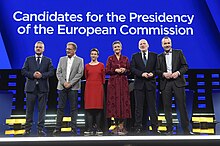
The president of the European Commission is the head of the European Commission, the executive branch of the European Union (EU). The president of the Commission leads a cabinet of Commissioners, referred to as the College. The president is empowered to allocate portfolios among, reshuffle, or dismiss Commissioners as necessary. The College directs the commission's civil service, sets the policy agenda and determines the legislative proposals it produces. The commission is the only body that can propose or draft bills to become EU laws.

Jean-Claude Juncker is a Luxembourgish politician who was the 23rd prime minister of Luxembourg from 1995 to 2013 and 12th president of the European Commission from 2014 to 2019. He also was Finance Minister from 1989 to 2009 and President of the Eurogroup from 2005 to 2013.
A candidate, or nominee, is the prospective recipient of an award or honor, or a person seeking or being considered for some kind of position; for example:

The European People's Party (EPP) is a European political party with Christian-democratic, liberal-conservative, and conservative member parties. A transnational organisation, it is composed of other political parties. Founded by primarily Christian-democratic parties in 1976, it has since broadened its membership to include liberal-conservative parties and parties with other centre-right political perspectives. On 31 May 2022, the party elected as its President Manfred Weber, who was also EPP's Spitzenkandidat in 2019.

Valdis Dombrovskis is a Latvian politician serving as Executive Vice President of the European Commission for An Economy that Works for People since 2019 and European Commissioner for Trade since 2020. He previously served as European Commissioner for Financial Stability, Financial Services and Capital Markets Union from 2016 to 2020 and Prime Minister of Latvia from 2009 to 2014.

Manfred Weber is a German politician who has served as President of the European People's Party (EPP) since 2022 and as Leader of the EPP Group in the European Parliament since 2014. He has been a Member of the European Parliament (MEP) from Germany since 2004. He is a member of the Christian Social Union in Bavaria (CSU), part of the European People's Party.

Margrethe Vestager is a Danish politician currently serving as Executive Vice President of the European Commission for A Europe Fit for the Digital Age since December 2019 and European Commissioner for Competition since 2014. Vestager is a member of the Danish Social Liberal Party, and of the Alliance of Liberals and Democrats for Europe Party (ALDE) on the European level.

The official title President of the European Union does not exist, but there are a number of presidents of European Union institutions, including:
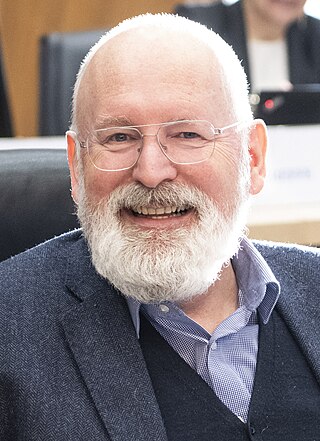
Franciscus Cornelis Gerardus Maria "Frans" Timmermans is a Dutch politician who most recently served as Executive Vice President of the European Commission for the European Green Deal and European Commissioner for Climate Action in the von der Leyen Commission from 2019 until his resignation in 2023. He is a member of the Dutch Labour Party (PvdA).

The 2014 European Parliament election was held in the European Union, from 22 to 25 May 2014.

Mariya Ivanova Gabriel is a Bulgarian politician and a member of the GERB party, serving as Deputy Prime Minister of Bulgaria and Minister of Foreign Affairs since 2023. She served as European Commissioner for Innovation, Research, Culture, Education and Youth between December 2019 and May 2023 and as a Member of the European Parliament (MEP) from 2009 to 2017.
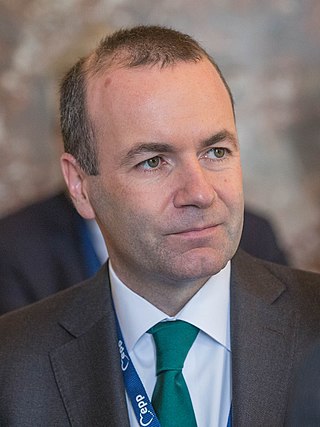
The 2019 European Parliament election was held between 23 and 26 May 2019, the ninth parliamentary election since the first direct elections in 1979. A total of 751 Members of the European Parliament (MEPs) represent more than 512 million people from 28 member states. In February 2018, the European Parliament had voted to decrease the number of MEPs from 751 to 705 if the United Kingdom were to withdraw from the European Union on 29 March 2019. However, the United Kingdom participated alongside other EU member states after an extension of Article 50 to 31 October 2019; therefore, the allocation of seats between the member states and the total number of seats remained as it had been in 2014. The Ninth European Parliament had its first plenary session on 2 July 2019.

The Juncker Commission was the European Commission in office from 1 November 2014 to 30 November 2019. Its president was Jean-Claude Juncker, who presided over 27 other commissioners. In July 2014, Juncker was officially elected to succeed José Manuel Barroso, who completed his second five-year term in that year.

2014 European Parliament elections were held in Slovenia on 25 May 2014. It was the first in the series of three elections held in the 2014, and the major test leading up to the parliamentary elections in July. The political atmosphere was in a crisis that started with the fall of Borut Pahor's government, then Janez Janša's government in 2013, the latter coming after Janša was accused of corruption. The cabinet of Alenka Bratušek was breaking up, as the former leader of the Positive Slovenia Zoran Janković, who was under the suspicion of corruption, announced his candidature for party president, even though the coalition parties threatened to leave the government if he was to be elected, which later he was.
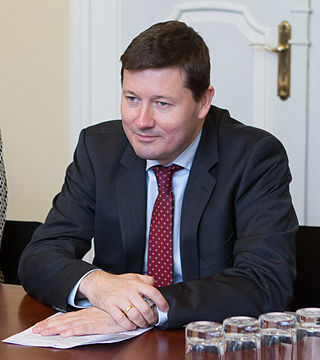
Martin Selmayr is a European civil servant from Germany who was Secretary-General of the European Commission from 2018 to 2019 and chief of staff to Commission President Jean-Claude Juncker from 2014 to 2018. During his time in the Juncker Commission, Selmayr was widely described as one of the most influential figures within the European Union. After taking office as secretary-general, he was described in a debate in the European Parliament as "the most powerful bureaucrat in the world." A resident of Brussels since 2000, he is a member of the Christian Democratic and Flemish (CD&V) party of Belgium. He is considered by many to be close to the Christian Democratic Union of Germany and its leadership, but the European Commission said he has never been a member of that party.
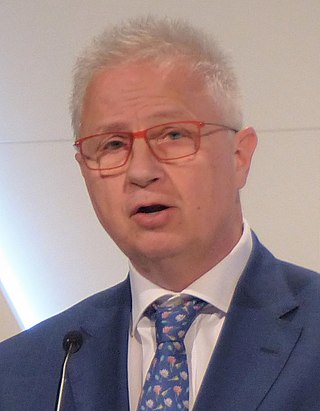
An election of Members of the European Parliament from Hungary to the European Parliament was held on 26 May 2019, electing the 21 members of the Hungary delegation to the European Parliament as part of the European elections held across the European Union.
The Eurovision Debate is a live televised debate between the lead political candidates (“Spitzenkandidaten”) running to be the next President of the European Commission. Produced by the European Broadcasting Union (EBU) and broadcast across Europe via the Eurovision network, it is hosted by the European Parliament in Brussels, Belgium. The aim of the debate is to help public service media play their role in the democratic process by helping to better inform citizens and encouraging participation in the elections.

The ninth European Parliament was elected during the 2019 elections and is slated to remain in session until the forthcoming 2024 elections.

The von der Leyen Commission is the current European Commission, in office since 1 December 2019 and is to last until the 2024 elections. It has Ursula von der Leyen as its president and it further consists of one commissioner from each of the member states of the European Union.

The 2024 European Parliament election is scheduled to be held on 6 to 9 June 2024. This will be the tenth parliamentary election since the first direct elections in 1979, and the first European Parliament election after Brexit.

